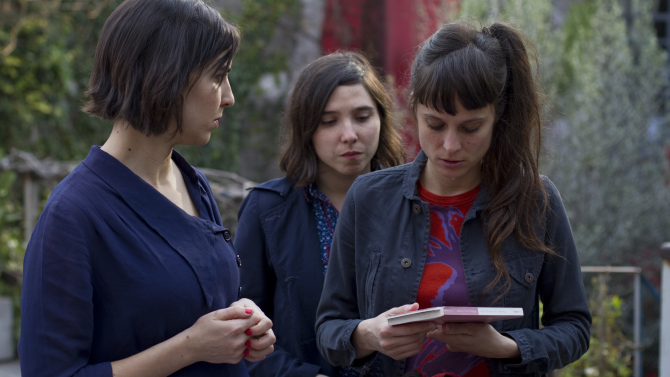By providing your information, you agree to our Terms of Use and our Privacy Policy. We use vendors that may also process your information to help provide our services. This site is protected by reCAPTCHA Enterprise and the Google Privacy Policy and Terms of Service apply.
Locarno Review: ‘The Princess of France’ Presents Shakespeare as You’ve Never Seen It Before
Eric Kohn

Argentine director Matias Piñero has steadily developed a penchant for borrowing from one of the most famous storytellers in history — no less than William Shakespeare — yet brings a confident sensibility that pushes the original text in fresh directions.
In 2011’s concise “Rosalinda,” he weaved the plot of “As You Like It” into a tale involving contemporary young lovers, and took a similar approach to 2012’s “Viola,” which involved an acting troupe rehearsing “Twelfth Night,” and sometimes inhabiting it. The resulting interplay of modern characters stuck between their lives and far grander theatrical dramas yielded a fascinating interplay of source materials.
For “The Princess of France,” the latest entry in a loose trilogy of Shakespearean experimentation, the director incorporates the playwright’s “Love’s Labour’s Lost” into another gentle contemporary fable with similarly compelling results. Piñero’s light touch once again provides a keen access point to a secretively advanced narrative technique. The movie opens with a prolonged overhead shot over a soccer game in downtown Argentina with the list of the characters superimposed on the image. It’s the first of many cases where the theatrical foundation comes into direct contact with Piñero’s restrained style.
In the ensuing 70-odd minutes, Piñero shifts focus from his previous female-centric dramas to focus on a man surrounding by them: Victor (Julán Larquier Tallarini), a young theater director last seen trying his hand at directing Shakespeare in “Viola,” resurfaces in town after dealing with his father’s death in the hopes of turning “Love’s Labor Lost” into an internet radio play. In the midst of these plans, he drifts through a series of romantic entanglements, finding that longtime girlfriend Paula has vanished. So he winds up developing an attraction to sweet-natured Ana, with whom he has previously flirted via email, while spreading gossip among the rest of his “Love Labour’s Lost” cast suggesting that he’s got yet another crush in town. In essence, he’s an unreliable narrator in a movie that follows suit.
The rambling love triangle regularly shifts into rehearsal and recording sessions, where the director’s roaming camera (aided by cinematographer Fernando Lockett) captures his actor’s faces up close as they recite lines from a play that notably involves several men who vow to swear off women. Victor hasn’t quite done that, but the movie implies that in his confused state, the role of women in his life has become a greater puzzle than he initially imagined.
 But no matter how much Victor ponders his life, “The Princess of France” maintains a liberated quality that extends beyond its protagonist. Piñero’s script drifts through a wide variety of conversations, including one notable tangent focused on 19th century French paintings, the focus of Ana’s academic studies. As she and Victor explore a series of nude images, Piñero quietly widens his frame once more, exploring the broader tensions between artifice and real life.
But no matter how much Victor ponders his life, “The Princess of France” maintains a liberated quality that extends beyond its protagonist. Piñero’s script drifts through a wide variety of conversations, including one notable tangent focused on 19th century French paintings, the focus of Ana’s academic studies. As she and Victor explore a series of nude images, Piñero quietly widens his frame once more, exploring the broader tensions between artifice and real life.
Needless to say, Piñero’s approach is loaded with interpretive possibilities, but he avoids any grand gestures on par with the sophistication implied by his layered concept. As a result, his movie develops an alienating effect that mirrors his protagonist’s sense of disconnect, though that occasionally limits the story’s emotional ramifications.
Still, it’s easy enough to roll with director’s freewheeling sensibilities. While not aspiring to the heights of the texts underscoring his work, Piñero displays a daring formalism that transcends its many inspirations to find its own unique rhythms. For Piñero’s characters, Shakespeare isn’t just a creative challenge; it establishes the rules of their universe, even as their director expertly breaks them by forging a new path.
Grade: A-
“The Princess of France” premiered at the Locarno Film Festival this week. Cinema Guild has acquired it for U.S. distribution in early 2015.
By providing your information, you agree to our Terms of Use and our Privacy Policy. We use vendors that may also process your information to help provide our services. This site is protected by reCAPTCHA Enterprise and the Google Privacy Policy and Terms of Service apply.
















